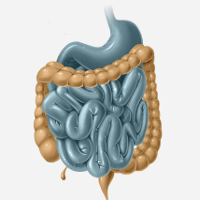By: Rosemary Clandos
November 13, 2017
Personalized dosing of omega-3 fatty acids decreases prostaglandin E2 in the colon, but the beneficial effects are smaller in overweight people, research finds.
Customized dosing of a cancer-preventive agent can significantly reduce a compound known to trigger colon cancer, a new study shows.
Using blood tests, researchers demonstrated that a fish oil supplement could lower prostaglandin E2 by 50 percent in normal-weight individuals. But those protective benefits were significantly reduced in study participants who have overweight or obesity — even though they received higher doses of the omega-3 supplement.
The study is published in Cancer Prevention Research.
Prostaglandin E2, or PGE2, is one of several important products the body uses to control inflammation and help healing. It is derived from omega-6 fatty acids.
Normally, PGE2 is regulated in cells and defends the colon against injuries and infections. But when PGE2 is out of balance and too much is made, it can lead to too much inflammation and to conditions such as cancer and heart disease. Other fatty acids, particularly omega-3 fatty acids, reduce the amount of omega-6 fatty acids available in a cell. This is a key system that controls how much PGE2 the cell makes.
“Our blood test of ratios of omega-3 and omega-6 fatty acids was one way to personalize fatty acid dosing, but it wasn’t enough in the case of overweight or obesity,” says Zora Djuric, Ph.D., cancer prevention researcher in the departments of family medicine and nutritional sciences at the University of Michigan. “The metabolic effects of having excess weight may reduce preventive strategies and increase the risk of colon cancers.”
Omega-3 supplementation to reduce inflammation
Two-thirds of the U.S. population is overweight or obese, and one of the effects of those conditions is a chronic pro-inflammatory state. When high inflammation continues for a long time, the constant overproduction of PGE2 can lead to cancer forming in the colon, says Djuric.











